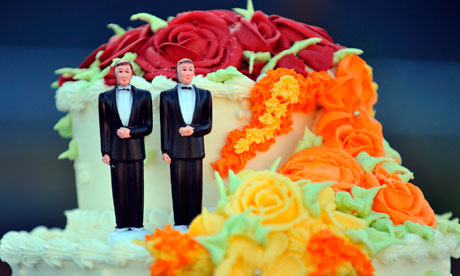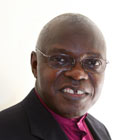
'The current difference between marriage and civil partnerships does not involve injustice, but the proposed changes arguably would, by creating two new varieties of marriage.' Photograph: Gabriel Bouys/AFP/Getty Images
I will be the first to accept that homosexual people have suffered discrimination and sometimes worse through the decades and that the churches have, at times, been complicit in this. There is much penance to be done before we can look our homosexual brothers and sisters in the eye. But that baleful history does not diminish the need to speak the truth in love.
I firmly believe that redefining marriage to embrace same-sex relationships would mean diminishing the meaning of marriage for most people, with very little if anything gained for homosexual people. If I am right, in the long term we would all be losers.
Of course, if someone should ask, "how will my marriage be affected if couples of the same sex can marry?", the answer is: not at all. But let me put the question another way: what sort of a society would we have if we came to see all family relationships primarily in terms of equal rights? The family is designed to meet the different needs of its different members in different ways. It is the model of the just society that responds intelligently to differences rather than treating everyone the same.
While I am a strong supporter of justice and equality of opportunity for all people, I want to insist that with those rights go our responsibilities to one another. These are enshrined, I believe, in our legal definition of marriage. Would we be a better society if we made marriage simply a private contract between two individuals, with no wider implications of kinship and family? I do not believe that we would. The issue is not the implication for any existing marriage, but the implication for people in the future, when the social meaning of marriage has been changed and, in my view, diminished.
Drawing parallels between the proposed the proposed same-sex marriage and inter-racial marriage ignores the fact that there is more than one paradigm of equality. For me, racial equality rests on the doctrine that there is only one race – the human race – and any difference of treatment on ethnic grounds is therefore unjustifiable. But there is another view, based on the complementary nature of men and women. In short, should there be equality between the sexes because a woman can do anything a man can do or because a good society needs the different perspectives of women and men equally?
As far back as Mary Wollstonecraft we find that second view pressed very firmly. We see it today in the welcome insistence that all-male committees, clubs and so on are not fit for purpose. Unless one believes that every difference between the sexes is a mere social construct, the question of equality between the sexes cannot be completely addressed by the paradigm of racial equality. Defining marriage as between a man and a woman is not discriminatory against same-sex couples. What I am pressing for is a kind of social pluralism that does not degenerate into a fancy-free individualism.
Civil partnerships in the United Kingdom, granted under the Civil Partnership Act 2004, give same-sex couples rights and responsibilities identical to marriage. There is a formal process for dissolving civil partnerships akin to divorce. This similarity does not turn them into marriage. They are different from marriage. They are in every respect in ethical terms an honourable contract of a committed relationship. This difference does not imply that they lack protection in law, economics and social standing. To change the law and smooth out this difference on grounds of equality would force unjustified change on the rest of the nation.
It is important for the understanding both of marriage and of civil partnership that the categories are not confused. The retention of the current understanding of marriage should not prevent gay and lesbian couples from being able to affirm and honour their relationship without being obliged to fit into another category.
The question for me is one of justice, and not equality. Justice is the primary category. It does not mean not treating everyone the same way,but giving everyone what they need or deserve: education to the young, homecare to the old, opportunity to the enterprising, protection to the threatened. Equality follows justice, and secures its consistent administration: not just some young people, but all, not just some threatened people but all. A clear picture of the just order is what makes equality objective. Without it, equality claims are liable to be subjective and contradictory.
If it was a question of justice, what injustice would result from not turning civil partners into married couples? I suggest: no injustice.
It is a great mistake to use the statute to give comfort and assurance. The rule of law exists to address injustices. The current difference between marriage and civil partnerships does not involve injustice, but the proposed changes arguably would, by creating two new varieties of marriage.
The virtue of the civil partnerships scheme lay in the attempt to treat the needs of gay and lesbian couples as what they are, not to bundle them into some other category. Marriage is built around complementarity of the sexes, and therefore the institution of marriage is a support for stable families and societies.
Those civil partners who consider that their partnership is still inadequately recognised should give the civil partnership legislation time to establish itself and gain increasing public understanding.
This is an edited extract of a paper that can be read in full at http://j.mp/JjgEpv
The following is taken from the full article found at the link above this line.
II Civil partnerships in the United Kingdom
granted under the Civil Partnership Act 2004, give same-sex couples rights and responsibilities identical to marriage. Civil partners are entitled to the same property rights as married opposite-sex couples, the same exemption as married couples on inheritance tax, social security and pension benefits, and also the ability to get parental responsibility for a partner's children, as well as responsibility for reasonable maintenance of one's partner and their children, tenancy rights, full life insurance recognition, next of kin rights in hospitals, and others. There is a formal process for dissolving civil partnerships akin to divorce.
This similarity does not turn them into marriage. They are different from marriage. They are in every respect in ethical terms an honourable contract of a committed relationship. This difference does not imply that they lack protection in law, economics and social standing. To change the law and smooth out this difference on grounds of equality would force unjustified change on the rest of the nation. It is important for the understanding both of marriage and of civil partnership that the categories are not confused. The retention of the current understanding of marriage should not prevent gay and lesbian couples from being able to affirm and honour their relationship without being obliged to fit into another category.
In fact it could be argued that to create two kinds of marriage, as is proposed, Civil Marriage and Religious Marriage, creates a distinction and a new inequality within marriage. Hitherto, England and Wales have had a unified law of marriage based on a unified idea of what marriage is. This important legal bedrock is being discarded.
If the proposals currently before us come into effect, for the first time there will be two levels of marriage recognised within English Law, one open only to different sex couples entered into at a Religious Ceremony, the other open both to different and to same sex couples entered into at a Registry Office.
However the question for me is one of justice, and not equality. Justice is the primary category. It does not mean not treating everyone the same way but giving everyone what he or she needs or deserves: education to the young, home-care to the old, opportunity to the enterprising, protection to the threatened. Equality follows justice, and secures its consistent administration: not just some young people but all, not just some threatened people but all. A clear picture of the just order is what makes equality objective. Without it equality-claims are liable to be subjective and contradictory.
If it was a question of justice, what injustice would result from not turning Civil Partners into married couples? I submit, No injustice.
The virtue of the Civil Partnerships scheme lay in the attempt to treat the needs of gay and lesbian couples as what they are, not to bundle them into some other category.
Marriage is built around complementarity of the sexes, and therefore the Institution of Marriage is a support for stable families and societies.
Those Civil Partners who consider that their partnership is still inadequately recognised should give the Civil Partnership legislation time to establish itself and gain increasing public understanding.
It is a great mistake to use the Statute to give comfort and assurance. The Rule of Law exists to address injustices. The current difference between marriage and Civil Partnerships does not involve injustice, but, arguably, the proposed changes would, by creating two new varieties of marriage.
- See more at: http://www.archbishopofyork.org/articles.php/2481/a-response-on-marriage-and-civil-partnerships#sthash.PEQVRlM1.dpuf

